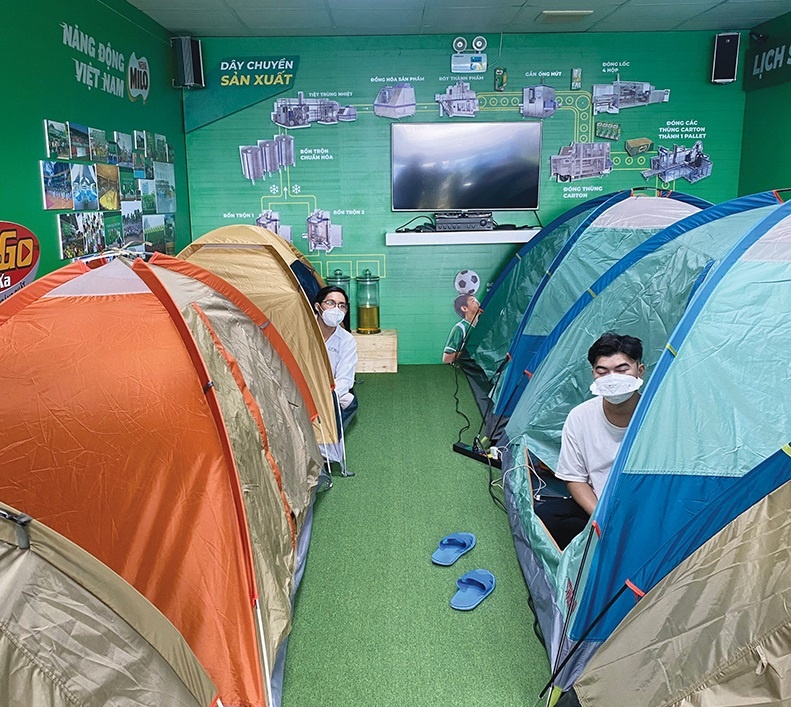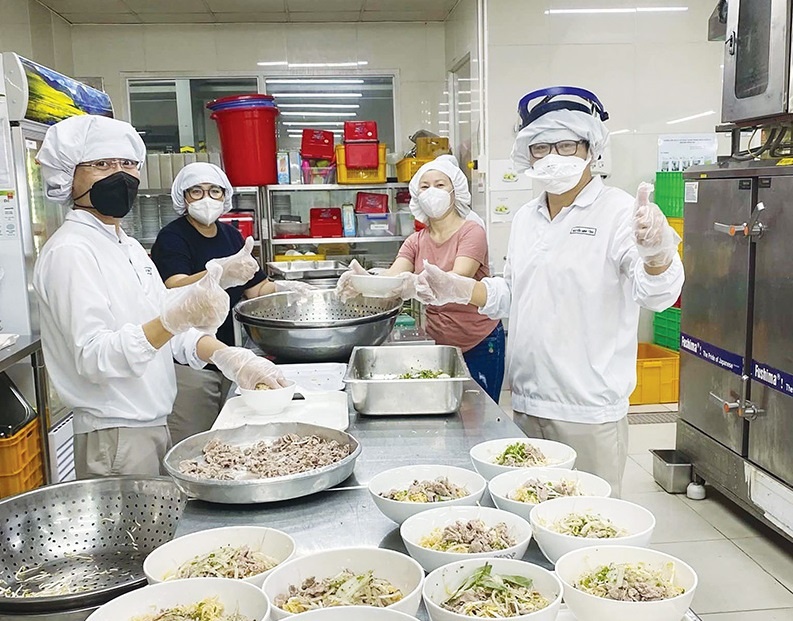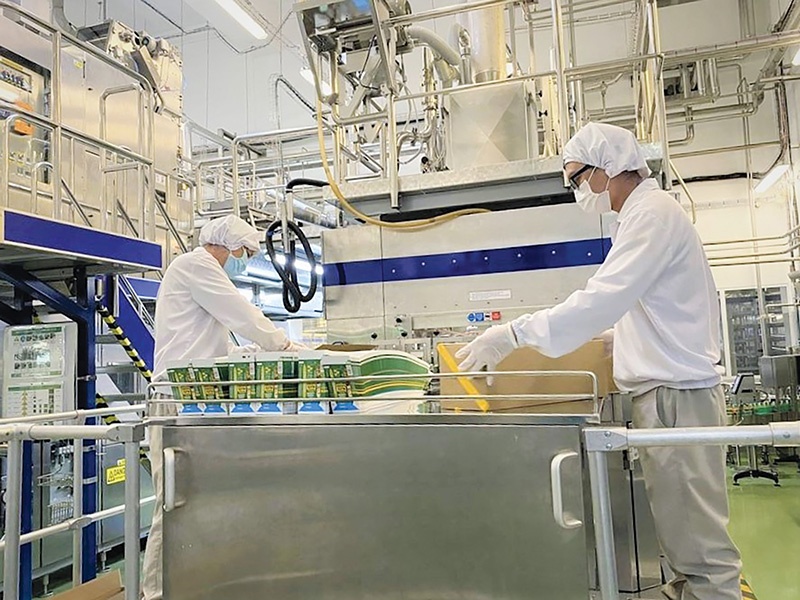Nestlé Vietnam at the fore of crisis response
 |
| Nestlé Vietnam has gone to great lengths to make living on-site comfortable for workers |
Social distancing measures imposed in various southern localities to combat the COVID-19 outbreaks have been a major disruption to the manufacturing of essential items.
According to Nielsen’s Retail Index, as of the end of July, the growth of the fast-moving consumer goods (FMCG) segment in Vietnam was heavily affected by the pandemic. The latest wave has dented recovery momentum, with the sector’s growth shrinking -5.8 per cent during social distancing in June and July.
With the strict enforcement of these measures, Binu Jacob, managing director of Nestlé Vietnam, admitted that the current wave has had a profound impact on the packaged food and beverage (F&B) industry. Enterprises have tried to ensure production and business continuity, but supply chains were severely affected.
Speaking at last week’s webinar on sustainable development and enterprises realising the goals of controlling the pandemic and advancing socioeconomic development, Jacob said that F&B businesses face many difficulties in logistics, decreasing consumer demand, and workplace safety. To overcome the challenges, most FMCG providers are focusing on care and safety for people, business continuity, and supporting the government and communities.
“Nestlé Vietnam cares about its employees and takes every measure to ensure their safety,” said Jacob. “As a food manufacturing and processing company, we are implementing the stay-at-work strategy to ensure the safety of employees on site, while keeping manufacturing on track.”
With 1,200 employees at four factories currently operating under the stay-at-work model, Nestlé Vietnam has paid special attention to taking care of its people over the past two months. The company strictly applies the Ministry of Health’s 5K principles and at at times went beyond the safety standards of local authorities. The company also organises engagement activities to cheer up employees living away from home.
 |
| Nestlé Vietnam at the fore of crisis response |
Meanwhile, Nestlé also provided equipment for all its employees working at home, such as tables, chairs, computers, and speakers, among others. This work-from-home policy aims to facilitate employees while working remotely during the crisis. The company also provides support to employees and their families by giving them medical support, conducting regular virtual sessions, and providing news on the internal social media network to keep them engaged.
 |
Besides protecting its people, Nestlé also employs different innovative solutions to ensure the supply of its essential goods. The company has rented more warehouses to improve its storage capability. It also offers direct deliveries to stores without a transshipment warehouse to quickly meet customer demand. Another solution is providing contactless deliveries to avoid cross-infections, despite a shortage of drivers in the south.
Nestlé Vietnam has actively supported the government’s fight against the pandemic since the beginning. The company was among the first businesses donating to the vaccine fund with a sum of $2.4 million, including material donations. The company aims to support 22,000 small business households to resume operations, efforts that have earned Nestlé Vietnam recognition by the Vietnam Women’s Union for special contributions.
Furthermore, Nestlé Vietnam has submitted some recommendations to the government and regulators to facilitate the operation of FMCG businesses during this tough time.
First, the company proposed the government to prioritise the full vaccination of workers and contractors producing essentials like F&B. Second, the government should allow businesses to apply different production models beside stay-at-work. In the long run, businesses need to combine many different models to ensure continuity and pandemic control.
Next, Nestlé Vietnam suggested simplifying and unifying pandemic regulations. Jacob cited the recent examples of truck drivers holding negative PCR test results but still being refused at checkpoints in some localities, causing congestions and delays. Removing these and similar barriers would improve the flow of goods, ultimately benefiting all stakeholders.
Lastly, the government was urged to digitalise administrative procedures to facilitate the submission and approval of documents online.
“We believe in the future of Vietnam as a global and regional manufacturing hub and continue to expand our investments here,” said Jacob. “Nestlé will invest more than $130 million in Vietnam over the next two years to double the production capacity for instant coffee for exports, while expanding its decaffeinated coffee bean production plant to become one of the largest facilities globally.”
In addition, the facility for liquid Maggi products in Dong Nai is slated to become a centre of expertise in professional liquid cooking products in Asia and Australia. Other expansion plans include producing ultra-premium, freeze-dried coffee in Vietnam for export to Japan as well as increasing the capacity of Nescafé Dolce Gusto capsules to export worldwide.
Established in 1995, Nestlé Vietnam has continuously expanded its operations in the country and offers diverse products to serve local and international demand. Up to now, Nestlé’s total investment in Vietnam has reached $730 million. The company employs 2,200 employees, with four factories in the country.
The company was voted among the top three Sustainable Enterprises in 2020 in the manufacturing sector by the Vietnam Business Council for Sustainable Development under the Vietnam Chamber of Commerce and Industry. Last year, Nestlé Vietnam was lauded by the Ministry of Finance for making significant contributions to Vietnam’s state coffers.
| Vu Anh Tuan - Deputy general director, C.P. Vietnam Since the first pandemic outbreak in 2020, C.P. Vietnam has changed its business model to ensure no disruptions. The company set three goals: complying with COVID-19 prevention and control measures by the government and local authorities; protecting the safety of employees and their families; and ensuring business continuity in the production and supply chain. Around 21 out of our 30 factories are under the stay-at-work model, which is a challenge. To avoid the risk of infections, we have disseminated the COVID-19 prevention rules to all on-site workers. Also, the company has taken care of the living conditions and supplies nutritious meals for workers. Another critical issue is to deliver goods from the farm to the market. There have been transport issues due to differences in movement regulations between localities. We have closely monitored to adjust to the regulations to avoid disruption. As of present, all of our factories remain in smooth operation, and some factories are recognised as a “green enterprise” by local authorities. Nguyen Thi Ngoc Hue - Manager, Corporate Comms and External Affairs, AEON Vietnam We have a strategy to retain the workforce during the pandemic to ensure business continuity. AEON has given priority to vaccinating workers and offered healthy food to improve their immune system. We have organised many activities during the social distancing period, such as online meetings and podcasts to share our message to employees. We do not conduct stay-at-work models like at factories. Our supermarkets have to open doors to serve customers. Thus, our staff are always anxious about the risks of coronavirus infections. Many F1 and F2 have gone to a central quarantine zone. To ease their anxiety, AEON has decided to pay fees for workers to quarantine themselves at hotels. This aims to support workers as well as encourage them to stay with the company in the long run. In addition, we also transformed our operation model and sped up our digital transformation during the crisis. AEON has organised 400 mobile sales points to deliver food and essentials to people in hard-to-reach areas like lockdown zones and suburban areas. The company has increased its online presence on its app, website, and food delivery platforms to serve customers better. Moreover, we have built a regional distribution centre to reduce transport costs and ensure stable prices for consumers. Cao Thi Ngoc Dung - Chairwoman, Phu Nhuan Jewellery JSC We started our business continuity strategy in response to the global health crisis. We have actively communicated this strategy to the workers to help them understand our action plan. We have stayed resilient to formulate different policies to adapt to the pandemic and also prepare our workers to face problems and overcome them. Even during the social distancing period, we provided training to our workforce and strengthened collaboration inside the organisation to increase resiliency. We have set up a special task force to provide medical care to employees and their families. We even offer 13th month salary so they can sustain their livelihoods during this trying time. Our goal is to protect and retain our workforce post-pandemic. Furthermore, we also actively conduct corporate social responsibility activities by organising zero-VND supermarkets in Ho Chi Minh City to serve those affected by the pandemic. When our retail stores closed, our staff became volunteers to serve at these zero-VND supermarkets, selling food and essential products. This initiative has received a warm response from the people. |
What the stars mean:
★ Poor ★ ★ Promising ★★★ Good ★★★★ Very good ★★★★★ Exceptional
 Tag:
Tag:
Themes: Together We Win
- Greater Mekong Subregion executives to discuss sustainable tourism
- TCPVN donates 1,200 medicine bags to COVID-19 patients in southwest
- AB InBev supports orphans with scholarships amid COVID-19
- Evaluating the reach of support in turbulent times
- Gamuda Land grants “Back to School” scholarships to support disadvantaged students
Related Contents
Latest News
More News
- The generics industry: unlocking new growth drivers (February 04, 2026 | 17:39)
- Vietnam ready to increase purchases of US goods (February 04, 2026 | 15:55)
- Steel industry faces challenges in 2026 (February 03, 2026 | 17:20)
- State corporations poised to drive 2026 growth (February 03, 2026 | 13:58)
- Why high-tech talent will define Vietnam’s growth (February 02, 2026 | 10:47)
- FMCG resilience amid varying storms (February 02, 2026 | 10:00)
- Customs reforms strengthen business confidence, support trade growth (February 01, 2026 | 08:20)
- Vietnam and US to launch sixth trade negotiation round (January 30, 2026 | 15:19)
- Digital publishing emerges as key growth driver in Vietnam (January 30, 2026 | 10:59)
- EVN signs key contract for Tri An hydropower expansion (January 30, 2026 | 10:57)






















 Mobile Version
Mobile Version